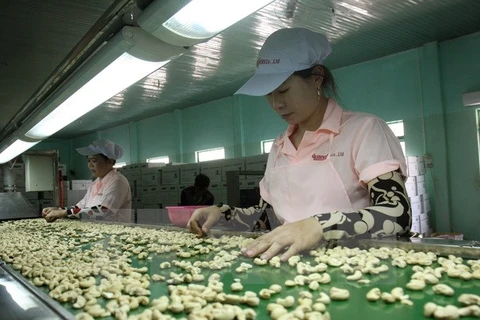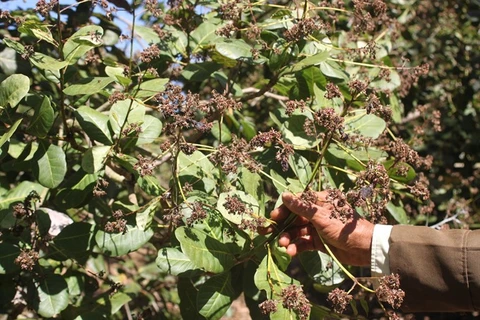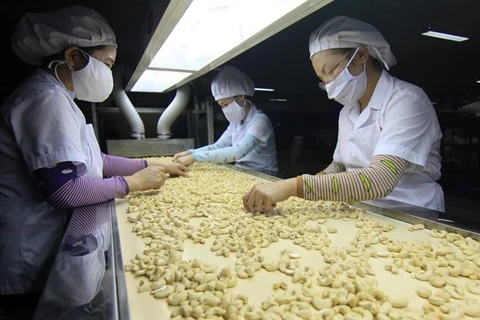 Workers process cashew for export at the Quang Son Co. Ltd in Phu Hoa district, Phu Yen province (Photo: VNA)
Workers process cashew for export at the Quang Son Co. Ltd in Phu Hoa district, Phu Yen province (Photo: VNA) HCM City (VNA) – About 500,000 tonnes of material cashew nuts will be imported from now to October to serve processing and meet the targeted export volume of 360,000 tonnes of cashew nuts this year.
According to the General Department of Vietnam Customs, 165,000 tonnes of cashew nuts worth about 1.62 billion USD were exported in the first six months of 2017, up 2.3 percent in volume and 27 percent in value from a year earlier.
Chairman of the Vietnam Cashew Association (Vinacas) Nguyen Duc Thanh said in this year’s first half, the domestic cashew nut supply was not enough for processing, so the industry had to import 400,000 tonnes of high-quality raw cashew nut from Africa in order to meet the market demand.
However, processors complained that while they had to import raw materials at high prices, product prices remained unchanged, cutting into their profits, Thanh noted.
[Binh Phuoc eyes more cashew products reaching global markets]
Vietnam has been the world’s No. 1 cashew nut exporter for 11 straight years and is set to keep this position for the 12th year as it is forecast to ship abroad 360,000 tonnes of cashew nuts worth 3.3 billion USD in 2017. Since the six-month shipments were equivalent to just 45 percent of this year’s target, the industry must work harder to realise this goal, according to Vinacas.
Although there remains one more harvest in the country from now to the end of 2017, the output is predicted to remain insufficient for processing.
Nguyen Quang Huyen, General Director of the Hoang Son 1 Co. Ltd, said the shortage of raw cashew nuts is not new. Major enterprises made preparations right from the year’s beginning to ensure production activities at their factories will not be interrupted. Only small firms without adequate storage have to wait for imported materials.
Nearly two-thirds of raw materials for Vietnam’s cashew industry are imported at present. The question of material supply remains unsolved, leaving the industry reliant on imports.
According to Vinacas Chairman Thanh, to ensure material supplies, it is necessary to plant new high-yield cashew varieties that are tolerant to climate change and diseases, while planting schedule should be adjusted to cope with climate change .-VNA
VNA
























